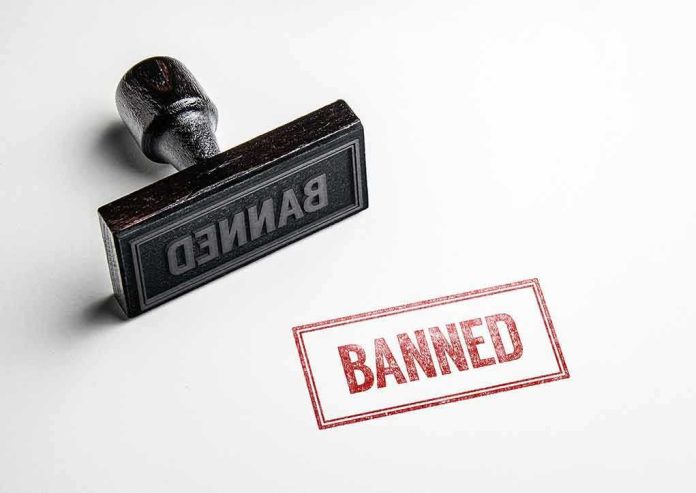
In a chilling echo of the past, a German store owner recently banned Jews from entering, reigniting global outrage and exposing the alarming resurgence of antisemitic violence that German authorities appear unable to control.
Story Snapshot
- Germany faces an unprecedented surge in antisemitic crimes, with over 1,000 incidents in early 2025 alone.
- Jewish communities report heightened fear, while officials struggle to contain violence and hate speech.
- Debate intensifies over the roots of this crisis, with far-right, far-left, and Islamist extremism fueling Jew-hatred.
- Recent incidents, including store bans, recall Germany’s darkest history and challenge its democratic values.
Record Antisemitic Surge Shakes Germany’s Jewish Communities
Germany has entered a period of unprecedented antisemitic violence, with the first three months of 2025 alone seeing 1,047 reported antisemitic crimes—including attempted murders. Jewish communities across the country, especially in major cities like Berlin, are reporting heightened fear and insecurity. Many individuals are now hiding religious symbols or even changing their names to avoid detection. The escalation follows the October 2023 Hamas attack on Israel, which triggered a global wave of Jew-hatred and has left German authorities scrambling to respond.
The spike in violence and hate speech is not confined to a single ideology. Far-right, far-left, and Islamist extremists are all identified as contributors to the surge, with ongoing debate about which group is most responsible. German officials, civil society watchdogs, and Jewish organizations agree that the scale and speed of antisemitic incidents are without precedent in postwar Germany. Notably, a recent incident in which a store owner banned Jews from entering his shop as a protest against Israeli policy sparked global outrage and condemnation from German officials—yet it also revealed the limits of legal and political responses to such acts of open discrimination.
Official Response and Public Criticism
Despite Germany’s legal framework expressly forbidding antisemitism, the government and law enforcement agencies face mounting criticism for their inability to contain the surge. Jewish leaders and civil society groups have accused authorities of underreporting and misclassifying antisemitic incidents, which further undermines public trust. Berlin’s police chief has even warned Jewish and LGBT residents to exercise caution in certain neighborhoods. The J7 Task Force’s May 2025 report underscores the depth of the crisis, calling for urgent adoption of global guidelines to counter antisemitism and warning that current efforts are manifestly inadequate.
Authorities’ failure to fully address the crisis is compounded by the complexity of the perpetrators’ motives and backgrounds. Police statistics tend to emphasize far-right involvement, while Jewish organizations and independent researchers point to significant roles played by Islamist and far-left actors. Civil society groups stress the need for a broad-based societal response—not just law enforcement—to effectively confront the multi-faceted threat. The debate over attribution continues, but the result is clear: Jewish life in Germany is increasingly under threat, and the country’s historical responsibility weighs heavily on both policy and public conscience.
Broader Implications: Democracy, Social Cohesion, and Historical Memory
The consequences of this antisemitic upsurge extend beyond the Jewish community. In the short term, increased police presence, security measures, and public debate have done little to quell fear or deter further attacks. The long-term risks are even more concerning: experts warn of a potential erosion of Jewish life in Germany, damage to the nation’s international reputation, and rising societal polarization that could undermine democratic norms. The current wave is unique not only in its intensity but also in its implications for Germany’s post-Holocaust identity as a democracy committed to combating hate. The symbolic weight of recent incidents—such as store bans reminiscent of the 1930s—serves as a grim reminder that vigilance is essential to safeguard both minority rights and the broader social fabric.
German officials condemn store owner who declared Jews banned from entry to protest Israel https://t.co/HyGnXo07ok #FoxNews
— CallieBenson (@CallieforTrump) September 22, 2025
Amid these challenges, the demand for effective action is growing louder. Jewish organizations, civil society, and international observers are calling on German leaders to strengthen enforcement, improve education, and promote real societal engagement against antisemitism. As the crisis intensifies, it remains a stark warning for all societies: attacks on one community’s rights and dignity threaten the foundation of freedom and democracy for all.
Sources:
Wikipedia: Antisemitism in 21st-century Germany
Euronews: Antisemitic incidents surge across Europe, ADL’s J7 report
Zentralrat der Juden in Deutschland: Press Release J7 Report




